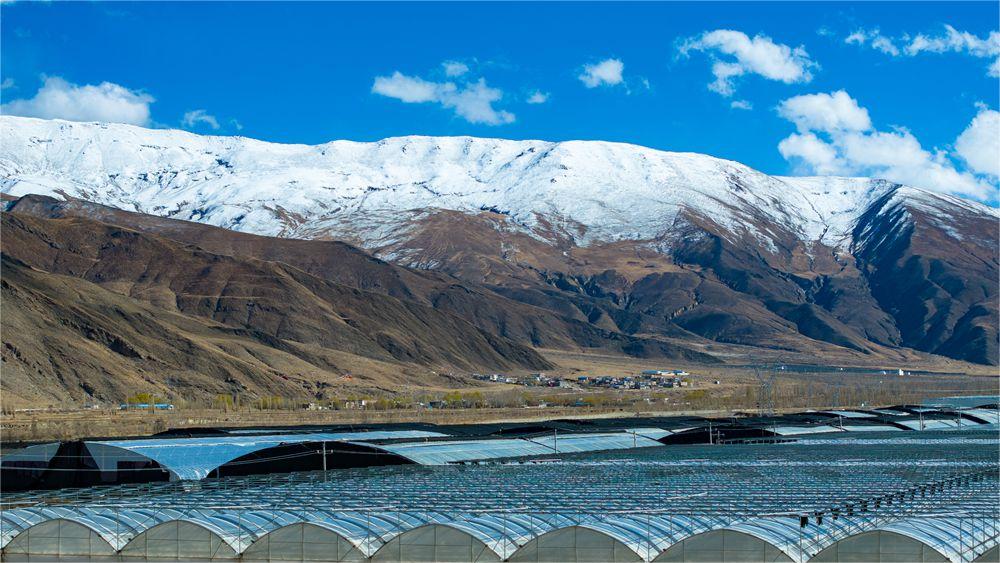Feature: Chinese "lighthouse factories" light up journey to new industrialization
GUANGZHOU, April 22 (Xinhua) -- With the same-sized production area and 50 percent fewer workers, to double up on productivity and stay ahead of the curve would be a goal too challenging for a factory to achieve. But in southern China's Guangdong Province, the workings of a sophisticated Chinese factory has managed to do just that, shedding light on modern-day productivity.
At a dishwasher production factory in Foshan city, a manufacturing hub in Guangdong Province, automated guided vehicles loaded with machine components were shuffling agilely at a production venue of around 1,000 square meters, while robotic arms in various forms and sizes were busy completing specific tasks with efficiency. Here, a brand-new dishwasher rolls off the production line in mere 18 seconds.
"We use big data and AI algorithms to empower production and reduce the technological burden on employees. I have a set of data that speaks for our transformation. From 3.5 million dishwashers we produced in 2015 to 7 million in 2021, we realized doubled productivity and output value with the same production site and 50 percent fewer workers," said Xiong Tao, chief digitalization engineer at the factory.
The factory is one of the many production lines of Chinese home appliance giant Midea Group that makes products spanning air conditioners, washing machines, refrigerators and gas water heaters.
According to Yao Binhui, director of Midea Group's digitalization business, the factory's efficiency has been a result of the group's efforts since 2012 to accelerate the formation of what is now known as "new quality productive forces" by transforming and upgrading its traditional production to a model that is more intelligent, digitalized, and greener. "Over the past decade or so, the group has invested up to 10 billion yuan to support our transformation from a traditional manufacturer to a technology group driven by digitalization."
Photovoltaics were installed on the factory's rooftops. "Currently green electricity supports 20 percent of the factory's power consumption," according to Xiong.
Midea Group's push for intelligent, digitalized and green manufacturing was recognized globally in 2020, when its household air-conditioning factory in Guangzhou, capital of Guangdong Province, became a lighthouse of the coveted Global Lighthouse Network (GLN).
The GLN was formed when the World Economic Forum (WEF) teamed up with McKinsey &Company in 2018 to identify the most innovative leaders in manufacturing. The WEF introduces the GLN as a globally recognized community transforming factory and value chain operations with Fourth Industrial Revolution technologies, with each member indisputably a leader in its respective industry.
Last year, Guangzhou-based GAC Aion New Energy Automobile Co., Ltd. also became one of the 21 newest lighthouses selected into the Network. Located in the city's Panyu District, the GAC Aion factory can finish the assembly of a new energy vehicle (NEV) in just 53 seconds.
The company made the news last July when China witnessed a record moment -- the nation's 20 millionth NEV rolled off a production line, with the vehicle manufactured by GAC Aion. The China Association of Automobile Manufacturers commented then that this record in NEV production meant that the NEV sector had entered a new stage of large-scale, globalized, and high-quality development, becoming an important part of China's modern industrial system.
According to the white paper released by the World Economic Forum in December 2023 titled "Global Lighthouse Network: Adopting AI at Speed and Scale," the newly recognized lighthouses in 2023 have implemented AI with high impact across every step of the supply chain.
In terms of production scheduling, the paper said that to satisfy customers' spiking demand for reliable and customized electric vehicles, GAC Aion deployed more than 40 Fourth Industrial Revolution use cases to provide customers with more than 100,000 configuration options and ensure timely and qualified deliveries.
"The fully automated production line supports mixed production of made-to-order and made-to-stock models, increasing production efficiency by 50 percent, reducing delivery time by 33 percent, raising first-pass yields by 8 percent and reducing manufacturing costs by 58 percent," it said in an introduction.
It added that GAC Aion also achieved a 48 percent decrease in energy consumption with a smart microgrid for sustainable manufacturing, and its AI control tower for autonomous material distribution increased material handling productivity by 67 percent.
"We currently have a team of 7,000 people engaged in R&D. Through digitalization, we have achieved personalized customization in production. Traditional car manufacturing is mostly about mass production, and that means every 30 or 60 vehicles are the same. But we are currently able to make each car different and completely customized to the user's orders," said Zhang Zhichu, director of an assembly workshop of GAC Aion.
In 2023, the firm produced and sold over 480,000 vehicles, a 77 percent surge year on year. The company has revealed plans recently to expand market in Southeast Asia, the Middle East, Europe, South America, and Africa this year.
Midea and GAC Aion epitomize the manufacturing sector's endeavor to go digital, intelligent and green in Guangdong, and in China, in general. China also ranked top in terms of the number of GLN lighthouses. Of the Network's 153 lighthouses across the globe so far, 62 are based in the country.
According to this year's Chinese government work report, China will strive to modernize its industrial system and develop new quality productive forces at a faster pace, by giving full rein to the leading role of innovation.
The country will also carry out technology transformation and upgrading in the manufacturing sector, foster and build up advanced manufacturing clusters, develop national demonstration zones for new industrialization, and make traditional industries more sophisticated, smarter, and more eco-friendly, the report said.
Photos
Related Stories
- Prototype of intelligent humanoid TongTong to be unveiled
- IT, high-tech makers power industry in Q1
- New quality productive forces empower spring farmland management
- SW China's enterprise makes efforts to develop new quality productive forces
- China unveils measures to promote industrial equipment upgrades
- Development of new quality productive forces drives industrial growth
Copyright © 2024 People's Daily Online. All Rights Reserved.









